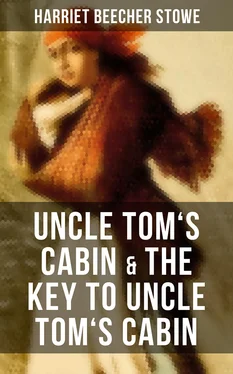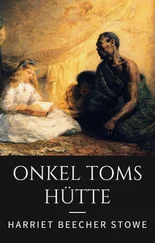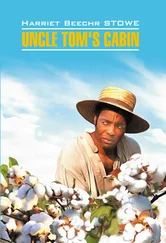"I never thought of the matter in this light," said Miss Ophelia.
"Well, I've travelled in England some, and I've looked over a good many documents as to the state of their lower classes; and I really think there is no denying Alfred, when he says that his slaves are better off than a large class of the population of England. You see, you must not infer, from what I have told you, that Alfred is what is called a hard master; for he isn't. He is despotic, and unmerciful to insubordination; he would shoot a fellow down with as little remorse as he would shoot a buck, if he opposed him. But, in general, he takes a sort of pride in having his slaves comfortably fed and accommodated.
"When I was with him, I insisted that he should do something for their instruction; and, to please me, he did get a chaplain, and used to have them catechized Sunday, though, I believe, in his heart, that he thought it would do about as much good to set a chaplain over his dogs and horses. And the fact is, that a mind stupefied and animalized by every bad influence from the hour of birth, spending the whole of every week-day in unreflecting toil, cannot be done much with by a few hours on Sunday. The teachers of Sunday-schools among the manufacturing population of England, and among plantation-hands in our country, could perhaps testify to the same result, there and here. Yet some striking exceptions there are among us, from the fact that the negro is naturally more impressible to religious sentiment than the white."
"Well," said Miss Ophelia, "how came you to give up your plantation life?"
"Well, we jogged on together some time, till Alfred saw plainly that I was no planter. He thought it absurd, after he had reformed, and altered, and improved everywhere, to suit my notions, that I still remained unsatisfied. The fact was, it was, after all, the THING that I hated—the using these men and women, the perpetuation of all this ignorance, brutality and vice,—just to make money for me!
"Besides, I was always interfering in the details. Being myself one of the laziest of mortals, I had altogether too much fellow-feeling for the lazy; and when poor, shiftless dogs put stones at the bottom of their cotton-baskets to make them weigh heavier, or filled their sacks with dirt, with cotton at the top, it seemed so exactly like what I should do if I were they, I couldn't and wouldn't have them flogged for it. Well, of course, there was an end of plantation discipline; and Alf and I came to about the same point that I and my respected father did, years before. So he told me that I was a womanish sentimentalist, and would never do for business life; and advised me to take the bank-stock and the New Orleans family mansion, and go to writing poetry, and let him manage the plantation. So we parted, and I came here."
"But why didn't you free your slaves?"
"Well, I wasn't up to that. To hold them as tools for money-making, I could not;—have them to help spend money, you know, didn't look quite so ugly to me. Some of them were old house-servants, to whom I was much attached; and the younger ones were children to the old. All were well satisfied to be as they were." He paused, and walked reflectively up and down the room.
"There was," said St. Clare, "a time in my life when I had plans and hopes of doing something in this world, more than to float and drift. I had vague, indistinct yearnings to be a sort of emancipator,—to free my native land from this spot and stain. All young men have had such fever-fits, I suppose, some time,—but then—"
"Why didn't you?" said Miss Ophelia;—"you ought not to put your hand to the plough, and look back."
"O, well, things didn't go with me as I expected, and I got the despair of living that Solomon did. I suppose it was a necessary incident to wisdom in us both; but, some how or other, instead of being actor and regenerator in society, I became a piece of driftwood, and have been floating and eddying about, ever since. Alfred scolds me, every time we meet; and he has the better of me, I grant,—for he really does something; his life is a logical result of his opinions and mine is a contemptible non sequitur."
"My dear cousin, can you be satisfied with such a way of spending your probation?"
"Satisfied! Was I not just telling you I despised it? But, then, to come back to this point,—we were on this liberation business. I don't think my feelings about slavery are peculiar. I find many men who, in their hearts, think of it just as I do. The land groans under it; and, bad as it is for the slave, it is worse, if anything, for the master. It takes no spectacles to see that a great class of vicious, improvident, degraded people, among us, are an evil to us, as well as to themselves. The capitalist and aristocrat of England cannot feel that as we do, because they do not mingle with the class they degrade as we do. They are in our homes; they are the associates of our children, and they form their minds faster than we can; for they are a race that children always will cling to and assimilate with. If Eva, now, was not more angel than ordinary, she would be ruined. We might as well allow the small-pox to run among them, and think our children would not take it, as to let them be uninstructed and vicious, and think our children will not be affected by that. Yet our laws positively and utterly forbid any efficient general educational system, and they do it wisely, too; for, just begin and thoroughly educate one generation, and the whole thing would be blown sky high. If we did not give them liberty, they would take it."
"And what do you think will be the end of this?" said Miss Ophelia.
"I don't know. One thing is certain,—that there is a mustering among the masses, the world over; and there is a dies irae coming on, sooner or later. The same thing is working in Europe, in England, and in this country. My mother used to tell me of a millennium that was coming, when Christ should reign, and all men should be free and happy. And she taught me, when I was a boy, to pray, 'thy kingdom come.' Sometimes I think all this sighing, and groaning, and stirring among the dry bones foretells what she used to tell me was coming. But who may abide the day of His appearing?"
"Augustine, sometimes I think you are not far from the kingdom," said Miss Ophelia, laying down her knitting, and looking anxiously at her cousin.
"Thank you for your good opinion, but it's up and down with me,—up to heaven's gate in theory, down in earth's dust in practice. But there's the teabell,—do let's go,—and don't say, now, I haven't had one downright serious talk, for once in my life."
At table, Marie alluded to the incident of Prue. "I suppose you'll think, cousin," she said, "that we are all barbarians."
"I think that's a barbarous thing," said Miss Ophelia, "but I don't think you are all barbarians."
"Well, now," said Marie, "I know it's impossible to get along with some of these creatures. They are so bad they ought not to live. I don't feel a particle of sympathy for such cases. If they'd only behave themselves, it would not happen."
"But, mamma," said Eva, "the poor creature was unhappy; that's what made her drink."
"O, fiddlestick! as if that were any excuse! I'm unhappy, very often. I presume," she said, pensively, "that I've had greater trials than ever she had. It's just because they are so bad. There's some of them that you cannot break in by any kind of severity. I remember father had a man that was so lazy he would run away just to get rid of work, and lie round in the swamps, stealing and doing all sorts of horrid things. That man was caught and whipped, time and again, and it never did him any good; and the last time he crawled off, though he couldn't but just go, and died in the swamp. There was no sort of reason for it, for father's hands were always treated kindly."
Читать дальше












